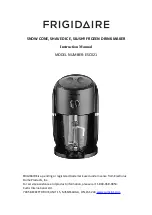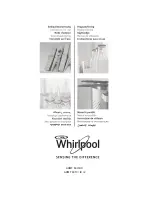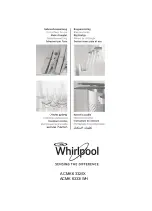
7
Gas Connections
LOCAL AUTHORITY REQUIREMENTS
Check Gas Type and specifications plate placed on the bottom face of the unit. All gas fitting work, service
and repairs can only be performed by an authorized person in accordance with the current edition of
AS/NZS5601 and local gas regulations. Failure to comply with this condition will render the warranty invalid.
Always unplug the appliance before carrying out any maintenance operations or repairs. The walls of the
units must not be higher than work top and must be capable of resisting temperatures of 75 above
temperature. Do not install the appliance near flammable materials (eg. curtains). The final act of any
installation or gas type conversion must be the full testing of this appliance, which includes leak testing,
ignition of each burner and the functionality of the burners separately and together.
INSTALLATION
The appliance is predisposed and adjusted to operate with the gas indicated on the specifications plate
(normally NG) applied onto the appliance. Please see gas rates summary information on the previous page.
If the appliance must be operated with a gas different than that indicated on the plate, it is necessary to
execute the following operations:
-Gas connection including regulator (NG) or
-Replacement of the injectors.
-New gas label attached stating gas type.
-Adjustment of minimum setting.
GAS CONNECTION
The connection must be made by a qualified gas fitter according to the relevant standard. The gas
connection is positioned 40mm from the left hand side (from front), 30mm in from the back edge.
The fitting (fig. 2) is made up of: 1 elbow fitting “A”, 1 gaskets “F”
The hob must be installed in a room with adequate ventilation (see installation section).
N.G.:
Fit the supplied NG regulator to the elbow fitting “A” using two spanners (note orientation of the NG regulator
gas flow).
Connect the other side of the NG regulator to the gas inlet pipe with the correct ½” BSPT thread connector
using two spanners.
U.L.P.G.:
Connect to the gas inlet pipe with the correct ½” BSPT thread connector (or using the appropriate adaptor)
using two spanners. Connect the other end of the pipe to the cylinder pressure regulator with appropriate
LPG gas regulator.
ORIENTATION OF THE ELBOW
The appliance is supplied with a gas connection oriented towards the centre of the cooking hob. The
connection to the gas supply must be effected only from this side or in vertical position by turning the elbow
downwards. To turn the elbow, first loosen the nut. Adjust the position of the elbow to the final position and
retighten the nut. Make sure that there are no leakages by testing with a soapy solution and brush.
IMPORTANT:
Never attempt to turn the elbow “A” without having first slackened off the relative lock nipple.
The seal “F” (fig. 2) seals the gas connection. It is recommended that it be replaced when it begins to show
even the slightest deformation or imperfection.
After connecting to the gas supply, check that the couplings are correctly sealed, using soapy solution and a
brush, but never a naked flame.
Where a flexible hose assembly is used, ensure it is approved to AS/NZS 1869, Class B Ø10mm, and no
longer than 1m. Any hose assembly must be restrained from accidental contact with the flue outlet of an
under-bench oven.
OPERATIONS TO BE PERFORMED WHEN CONVERTING GAS TYPES
Fig. 2


































